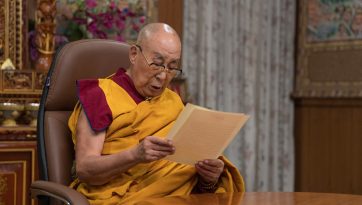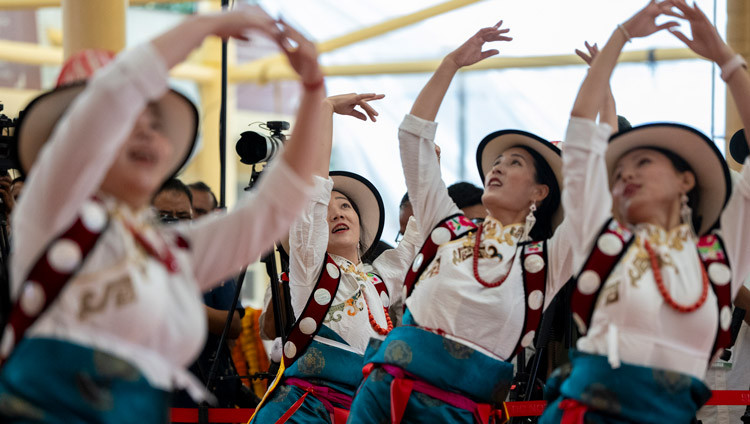The Relevance of Ancient Indian Knowledge in Contemporary India
August 8, 2018
The skies were heavy with monsoon clouds, the fields and trees were vivid green, but the roads were remarkably clear due to efficient police traffic management. His Holiness was welcomed on arrival by Director, Ajit Parulekar and the Chairman of the Board, Ashok Chandra, who escorted him through the hall to the stage. When he stepped out onto it an affectionate cheer went up. As is customary, he participated in lighting the inaugural lamp.
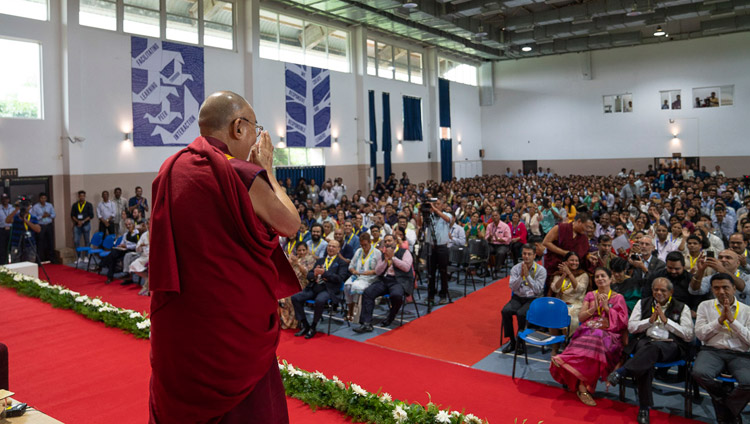
Chairman Ashok Chandra, on behalf of the Institute told His Holiness that it was a matter of great pride that he had honoured them by accepting their invitation. He also welcomed Father Romuald d’Souza, who set up the Institute 25 years ago, noting that without the founders’ support there would be no GIM today. He said he liked to believe GIM was special because, like a human being, it asks itself, who am I? what are my values? Ethics and human values are important to GIM, which tries to live by them and inculcate them into its students.
Director Ajit Parulekar spoke enthusiastically of a new partnership between GIM and the Dalai Lama Center for Ethics and Transformative Values at MIT, which is intended to enhance the learning of ethics in the institute. He mentioned that Ven Tenzin Priyadarshi of DLCETV regretted being unable to attend today’s function. The partnership aims to set new standards for training in ethics and empathy in order that they permeate all of aspects of civic society. In an uncertain and volatile world this will require the emergence of responsible leadership, to which GIM can make an effective contribution. The Director also mentioned that GIM will oversee the introduction of the Social, Emotional and Ethical Learning curriculum developed by the Emory-Tibet partnership in Goan schools.
Father Romuald d’Souza told His Holiness that GIM has included ethics in its business courses from the beginning, taking a rational approach. He added that by encouraging compassion, forgiveness and mercy the institute aims to educate the heart as well as the brain.
Right at the start of his talk, His Holiness asked Father d’Souza how old he was and was impressed to hear he was 93. He conceded that he was 10 years younger, which he acknowledged in his introduction:
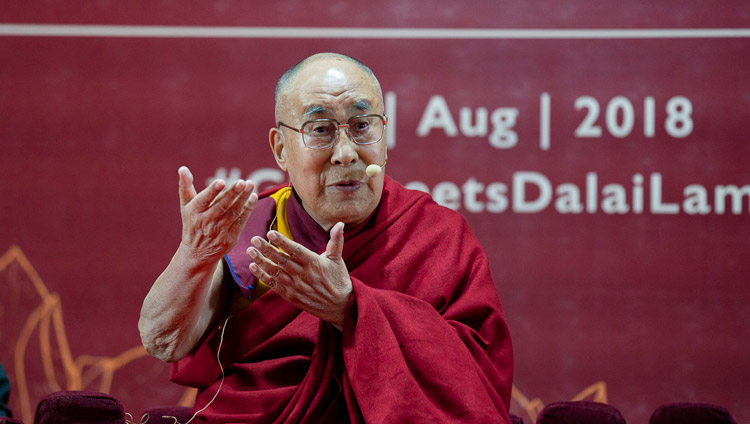
“Respected elder brother, and the rest of you brothers and sisters, I’m extremely happy to be here to share some of my thoughts with you.”
Taking his cue from a slogan on the wall of the hall, ‘the learning never stops at GIM’, he mentioned a Tibetan scholar who famously advised that even if you will die tomorrow, it’s worth studying and learning something today because of the positive impact it can have on the mind.
“We may be conscious on a sensory level, but learning takes place on a mental level,” he continued, “which is why it’s important to pay attention to our mental consciousness. We need to examine our consciousness at a deeper level than our waking state, dominated as it is by sensory experience. Consciousness is subtler when we dream and there are no external sensory distractions. In deep sleep it is even subtler, but the subtlest consciousness manifests at the time of death. Indeed there are some people who are able to access this level of consciousness and their bodies remain fresh for a time after clinical death has taken place. Scientists are investigating this phenomenon to understand what is going on.
“On a sensory level consciousness is related to pleasing sights, sounds, smells, tastes and aspects of touch, including sex. But anger and loving kindness are not sensory experiences. They take place on the level of the mind. Modern education tends to pay more attention to material goals and sensory experience. Although all religious traditions teach about love, tolerance and so forth, in India the longstanding practices for developing a calmly abiding mind (shamatha) and analytical insight (vipashyana) have given rise to a thorough understanding of the workings of the mind and emotions.
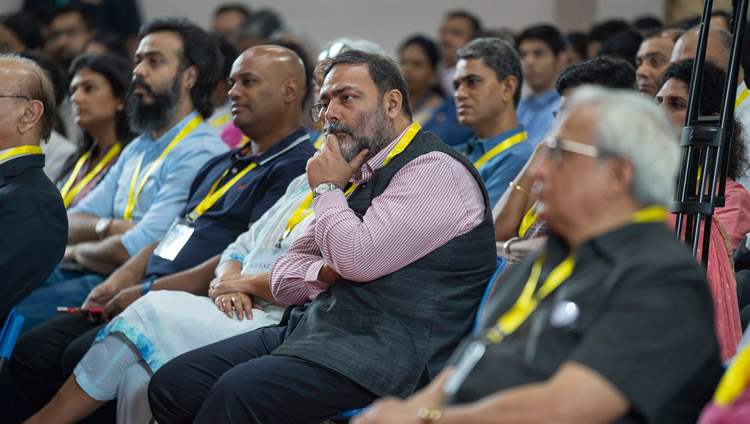
“In today’s world, which is facing an emotional crisis, such knowledge is not only relevant, it’s valuable. Scientists tell us they have evidence that basic human nature is compassionate. This is borne out by our common experience of our mother’s care and affection in our infancy, without which we would not survive. Scientists have also observed that constant anger, fear and suspicion undermine our immune system, whereas a compassionate attitude sustains it.
“We are social animals. Altruism attracts friends and brings people together; anger drives them apart.
“Until about 200 years ago, education was the province of religious institutions, which were responsible for instilling a sense of moral principles in their followers. Since education and religious establishments parted company this responsibility has lapsed. We all need moral principles for our own peace of mind, so they should be part of our education. I believe that only in India can modern education be combined with ancient Indian knowledge of the mind and emotions.”
His Holiness observed that although such knowledge developed in India, in the course of time interest in it deteriorated. However, in upholding the Nalanda Tradition, Tibetans kept it alive and have brought it back to the land of its birth. He suggested that reviving ancient Indian understanding of the mind and emotions, reason and logic, in India, is a contribution Tibetans can make. He mentioned that in the re-established Monastic Universities, mostly in Karnataka, there are 10,000 monks and nuns trained and equipped to teach. Many of them today are capable of communicating in English, Hindi, and Kannada, in addition to Tibetan.
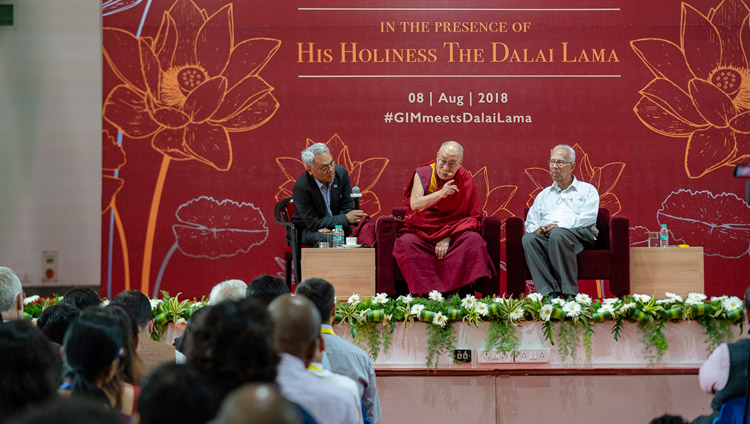
He spoke of encouraging Indians settled abroad to invite others to share festivals like Diwali and to discuss longstanding Indian traditions like ahimsa or non-violence. He also contended that as the world’s most populous democratic country, India should show the world that it is possible for religious traditions to live together in harmony.
“We can achieve peace of mind if we tackle our destructive emotions, so the goal of making the 21st century an era of peace and compassion is feasible. It will involve finding solutions to problems in dialogue, not the use of force. Therefore, demilitarization becomes another goal, as does the planned elimination of nuclear weapons. But for any of these goals to be fulfilled, they must be founded first of all on a sense of inner disarmament.”
His Holiness invited questions from the audience and the first questioner wanted to know how to apply ancient Indian knowledge in day to day life. He advised her that it would involve studying the mind and emotions in a rational logical way. He referred to a couple of American cities, one that has declared itself a city of compassion and the other that has redefined itself as a city of kindness. Because of the focus on kindness and compassion and programs associated with them, students in both cities have become noticeably less violent and more ready to help others.
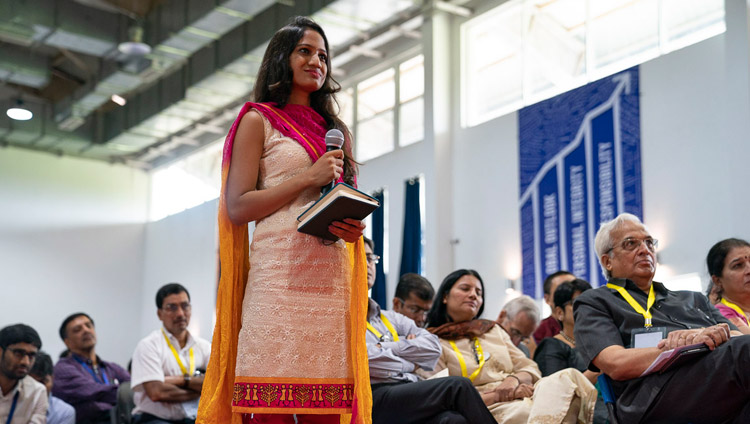
Asked how to find peace of mind, His Holiness recommended taking a more holistic view of problems you face. If you look at them only from one angle, they may seem overwhelming, while from a wider perspective they seem more manageable. He quoted the 8th century Indian master Shantideva who counseled analyzing a challenging situation to discover if it could be overcome. If it could, there’d be no need to worry. Instead you should act. If it couldn’t be overcome, worrying about it wouldn’t help.
His Holiness was invited to talk about a time when he was afraid and he referred to the night of 17th March 1959 when he escaped from Lhasa. His efforts to mediate with the Chinese communist forces had broken down and there seemed no option but to leave. But that involved passing the Chinese military camp in the dark and crossing a large river. He was afraid inasmuch as he didn’t know if he would see the dawn of the following day. Once over the first pass his fear began to subside.
“Chinese communists work on the basis that power comes from the barrel of a gun, from military force. But Tibetans’ strength lies in the truth. The power of the gun is temporarily decisive, but in the long run it is the power of truth that is the longer lasting.” The audience applauded.
“We raised the question of Tibet at the UN to little effect. Nehru told me that the USA would not go to war with China over Tibet and that sooner or later we would have to enter into discussions with the Chinese. Since 1976 we have not sought independence. This has no bearing on what is past. Chinese historical records show that in 7th, 8th and 9th centuries Chinese, Mongolian and Tibetan empires flourished. Today, I admire the spirit of the European Union whose members place the common interest before national sovereignty. In such a spirit, if we secured the rights granted us under the Chinese constitution, there could be benefit in our remaining with the PRC.”
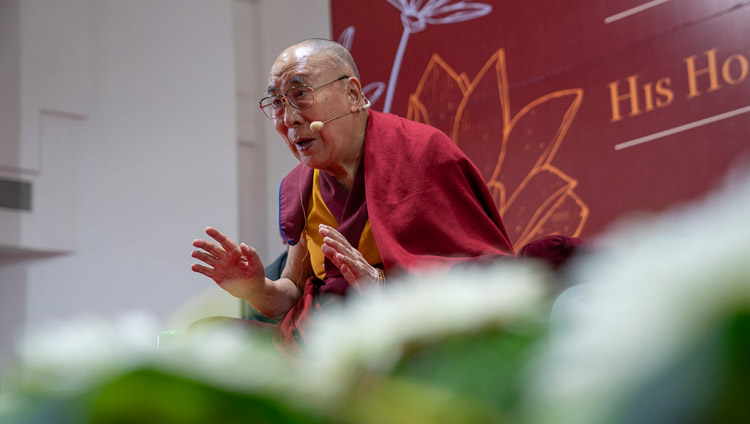
To counter the possibility of taking wrong decisions under the influence of negative emotions, His Holiness once again commended taking a more holistic view of the situation. He remarked that he understood that Mahatma Gandhi had been prepared to let Jinnah become Prime Minister of independent India, but Nehru had opposed him due to his own ambitions. He added that Nehru was wise in many ways, but that sometimes mistakes happen. The important thing, His Holiness said, is that responsibility for taking decisions is on your own shoulders. You should reach your decision after careful consideration, then stick to it and follow it through.
He explained that destructive emotions arise out of ignorance, specifically mistaking how things appear for reality. Despite their appearing to have independent or intrinsic existence, when we understand that phenomena arise in dependence on other factors, our tendency to give in to negative emotions becomes thinner.
A final questioner asked what His Holiness thought when he was recognised as the Dalai Lama. He reported that his mother told him that on the day the search party from the Tibetan Government reached his house, he had been especially excited. He ran towards them and recognised several of them—presumably the result of some previous memory.
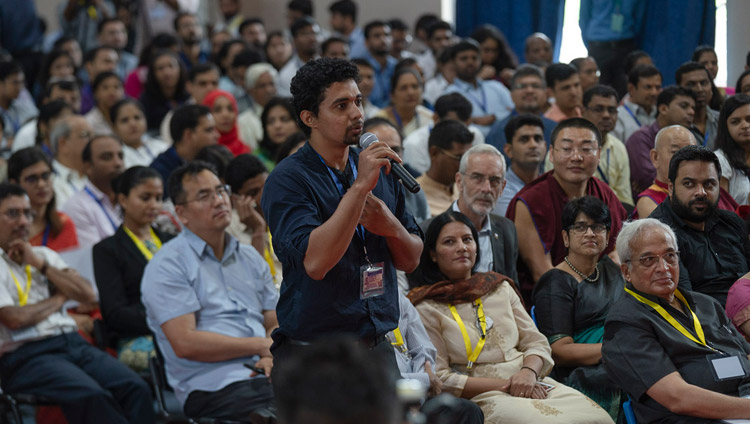
As to the future of the institution of Dalai Lamas, His Holiness has made it clear since 1969 that whether or not there is a 15th Dalai Lama will be up to the Tibetan people to decide.
“My responsibility now is to see that my day to day life is meaningful. I am guided by the following prayer:
For as long as space endures
And for as long as living beings remain,
Until then may I too abide
To dispel the misery of the world.
“I am determined to follow that through. An individual can make a differene. As human beings, you all want to live a happy life. If you’ve found anything I said interesting, share it with your friends—that’s how ideas are spread. If what I said was of little interest, please feel free to forget it. Thank you.”
The hall was again filled with sustained and warm applause.
The Director thanked everyone who had contributed to making the event a success. His Holiness then joined invited guests for lunch, following which he returned to his hotel. Tomorrow he will travel to Bengaluru.

